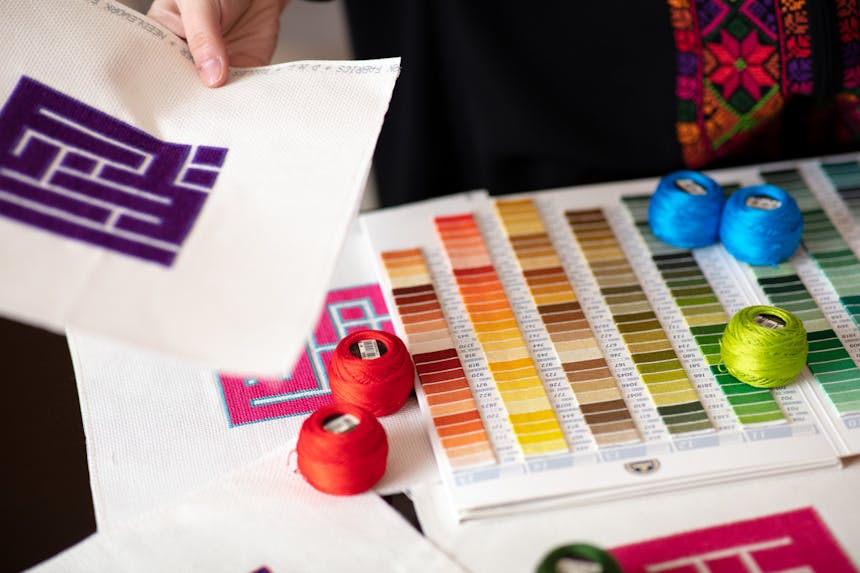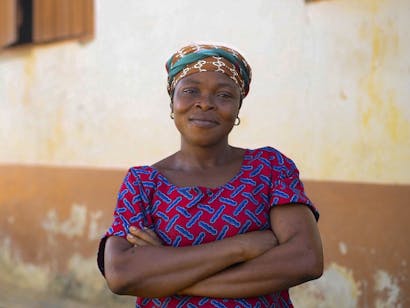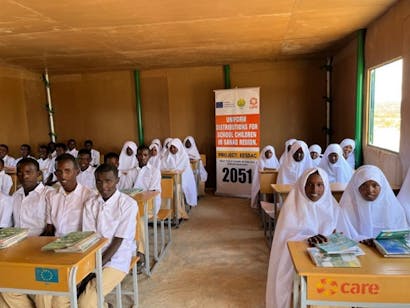Basma Nazer is a social entrepreneur from Jordan
Jordan has a long history of welcoming and hosting hundreds of thousands of refugees into its small country. It was here that Basma wanted to make a difference.

“I am so proud of my achievements, I am not only empowering women in refugee camps, but also helping to solve big issues.” Basma Nazer from Jordan recognized a problem facing many women in her country and was not content to sit back and do nothing.
Recognizing the 370,000 Palestinian refugees in Jordan, the majority of whom are living in poverty in refugee camps, 34-year-old Basma sought to find a way to support the most vulnerable group within that population – the women. From this passion, her social enterprise ‘Khoyoot’, translating as Threads, was born.
Simply as a result of being a woman, the majority of the female refugees have limited education and lack basic life skills. In addition, many families marry their daughters early, leading to an increase in child brides. Although the women are able to work, 80% of them are forced to remain in their homes due to social constraints.
Skills Strengthening
Basma’s Khoyoot Initiative creates partnerships with women in refugee camps to produce hand embroidered products. Khoyoot provides them with embroidery courses, after which they can join other course graduates in creating different product lines. Basma explains: “Once they have completed the courses, we help the women in marketing and branding the different product lines to sell worldwide.”
The revenue from the sales of the products is then used to fund more courses and fund initiatives within the camp. Basma continues: “Along with the financial benefits came a sense of contribution and a spark of hope that outcomes will change for future generations. Khoyoot connected the heart of the camp with the rest of the world in an attempt to increase equality and promote awareness.”
Challenges along the way
Despite this huge success, Basma has faced a number of challenges along the way, for example challenging the mentality of the men in the camp to allow the women to take part in her classes. Basma explains: “In the refugee camp not all men believe in women. Men put many restrictions on them and it is really difficult. We tried to speak many times to men but it was not successful. We could only change their mentality when they saw that the women and daughters are earning an income. I changed the women from a financial burden to their families to a financial source of income and this has changed their lives.”

She continues: “In the camp there are many more changes needed. Educating little boys about the role of women is very important. Women should not only be seen in the house with specific tasks. Women can play many other roles and can be a financial source of income too.”
How COVID-19 affects the work
The COVID-19 is further complicating matters for Basma and the refugees due to movement restrictions, which means Basma is unable to enter the camp and keep the enterprise going. She explains:“I can no longer send our products outside Jordan, nor import fabrics from Europe. This has massively affected our work. The women depend on Khoyoot for their daily income, which they no longer have. The women in the camp need us now the most. We are trying our best to help but due to the limited material we cannot proceed with further production. The women are asking for loans or they go to charities to see if they have any food supplies during this period.”
Not one to be defeated, Basma adds: “We are sourcing material locally now and we are trying to come up with new product lines that can help the women have a daily income. My message to all businesses around the world during COVID-19 is to try to innovate and change the business model so they can have new products that can sell in this tough time.”
Proud of her achievements
Through her enterprise, Basma is not only reaching and supporting women, but she is also employing women to coordinate and run the projects. Her work is very targeted and each of her five product lines tackle a specific issue – for example early marriage. She adds: “I am so proud of my achievements, I am not only empowering women in refugee camps, but also helping to solve big issues like gender based violence.”

She continues: “I am also proud that I was able to launch many high quality product lines from the camp. It has taken a lot of time to change the women from beginners to experts, but now we are reaching 15 countries around the world through this initiative. People are buying the story behind the product more than the product itself.”
Support from CARE
Basma received support from CARE as she grew her enterprise. She benefited from business training, as well as a grant to channel into the training of the women refugees and materials for the embroidery. She adds: “Business is never successful without ongoing training. The CARE training was amazing with step by step guidance on important skills, with an experienced mentor. I also learnt about public speaking which is important for my enterprise.” She adds: “With CARE’s support we were able to reach new markets and work more on the branding.”
Role model
Basma has recently been selected as a role model by CARE Jordan to tour the country and inspire other women who are thinking of setting up their own businesses: “I want to encourage women to start their own business. It needs so much passion, hard work and patience but it always pays off.” Reflecting on her other achievements Basma shines with pride at having won the Princess Basma Award for Social Work and the Crown Prince Foundation Prize for empowering women.

Basma has many ambitions for the future and hopes to expand their product lines and reach even more countries worldwide. Personally, she wants to continue educating herself, but her main focus is on others. “I want to help as many women as possible and empower them socially, culturally and economically.”


